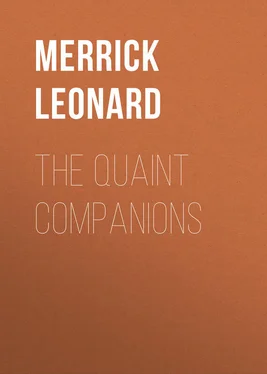Leonard Merrick - The Quaint Companions
Здесь есть возможность читать онлайн «Leonard Merrick - The Quaint Companions» — ознакомительный отрывок электронной книги совершенно бесплатно, а после прочтения отрывка купить полную версию. В некоторых случаях можно слушать аудио, скачать через торрент в формате fb2 и присутствует краткое содержание. Жанр: foreign_antique, foreign_prose, на английском языке. Описание произведения, (предисловие) а так же отзывы посетителей доступны на портале библиотеки ЛибКат.
- Название:The Quaint Companions
- Автор:
- Жанр:
- Год:неизвестен
- ISBN:нет данных
- Рейтинг книги:3 / 5. Голосов: 1
-
Избранное:Добавить в избранное
- Отзывы:
-
Ваша оценка:
- 60
- 1
- 2
- 3
- 4
- 5
The Quaint Companions: краткое содержание, описание и аннотация
Предлагаем к чтению аннотацию, описание, краткое содержание или предисловие (зависит от того, что написал сам автор книги «The Quaint Companions»). Если вы не нашли необходимую информацию о книге — напишите в комментариях, мы постараемся отыскать её.
The Quaint Companions — читать онлайн ознакомительный отрывок
Ниже представлен текст книги, разбитый по страницам. Система сохранения места последней прочитанной страницы, позволяет с удобством читать онлайн бесплатно книгу «The Quaint Companions», без необходимости каждый раз заново искать на чём Вы остановились. Поставьте закладку, и сможете в любой момент перейти на страницу, на которой закончили чтение.
Интервал:
Закладка:
"So shall I," she returned. She picked the rings up one by one, and held them out to him with a sigh.
"What, you won't keep them?" he inquired. Though his impulse had taken a theatrical form, it was quite sincere.
"Keep them?" She looked at him amazed. "Do you mean to say you really gave them to me to keep?"
"Why shouldn't I give them to you? I'll give you anything you like. Go on, put them on, or – they're too big for you – put them in your pocket. Yes, I mean it – they're yours."
"Oh," she exclaimed, "I can't keep things from you like – But you're joking?"
"I mean it," he repeated. "Bless me, why not? I want you to have them. They're a present."
"You must be mad," she faltered: "I can't accept presents from you. It's very kind of you – very generous – but it isn't possible."
He extended his hand an inch at the time. She laid them in the yellowish palm, and watched him slip them over the finger-nails that looked as if they were bruised. Her heart dropped heavily.
"It wasn't rude to offer them to you, was it?" he asked. "I didn't mean to offend you, you know."
"I'm not offended," she said. "But – but ladies can't take presents from men – not valuable presents, hundreds of pounds' worth of rings."
"Mustn't I give you anything?"
The rings magnetised her; she couldn't wrench her gaze from them.
"What for? Are you so sorry for me – the idiot who thought she could sing?"
"It's not that; it's nothing to do with your singing. Sweets? May I give you sweets?"
"I" – her eyelids fell – "I suppose so."
"What else?"
"Why should you give me anything at all?"
"Because I want to; because I – like you, Ownie… Tell me what I can get for you."
He leant nearer to her. She quivered in realising what he meant. Her physical impulse was to repel him, and the cravings of her mind tempted her to let him hope. She hesitated a moment.
"Get me some sweets, then," she said unsteadily. "I must go, or I shall be late."
CHAPTER IV
When the time came for him to return to town, Mrs. Tremlett's first-floor lodgers left her, and Lee took the vacant rooms. Though his headquarters were in London, it was understood that he meant to run down to Brighton very often during the winter, and he explained that he would find private apartments more to his taste than an hotel.
Telegrams from different places were received from him every few days, and in Sunnyview House the theatrical element in his nature, found its supreme expression. Profuse at all times, he surpassed himself here. He was infatuated – blind to everything but the passion that had sprung up in him – and he meant to show the woman whom he burned to marry the sort of thing he could bestow on his wife. The housemaid, accustomed to speculating whether the parting tip would be a half-crown or five shillings, was dumfounded by a sovereign almost as often as he rang the bell; the supply of roses in his room made it look like a flower-show; prize peaches were ordered, only that they might be left to rot on the sideboard, and he had two bottles of champagne opened daily for the effect of banishing them to the kitchen three-parts full.
He had not failed, either, to place a liberal interpretation upon "sweets." The rain of bonbons and bouquets that descended on the discontented blonde in rusty crape could hardly have been more persistent if she had been a prima donna, and his prodigality made the desired sensation in a household where the "drawing-rooms" usually took mental photographs of the joints before they were removed. Mrs. Tremlett it horrified, but to her daughter there was a strong fascination in it, a fascination even more potent than it exerted over the servants – a class who rejoice at extravagance, whether it be their own or other people's. She was not backward in deriving the moral; she, too, might enjoy this lavish life if she allowed him to ask her! The chance had befallen her so suddenly that it dizzied her. She felt strange to herself; she could not realise her point of view. His admiration for her had improved his appearance very much, but it could not quell the race prejudice entirely. She knew that if he had been a nonentity she would have found his homage preposterous; and ardently as she longed to embrace the life that he could open to her, she shrank from the thought of embracing the man.
She was aware, nevertheless, that she was precipitating a moment when it would be necessary for her to take a definite course, and she was not surprised to hear Mrs. Tremlett broach the subject to her one afternoon. The landlady was making out the dining-room bill, and Ownie had been sitting upstairs, in the twilight, while Lee sang to her at the grand piano that he had hired as soon as he was installed. In the morning he practised his cadenzas and phrases alone, but in the afternoon he sang, and had begged her to go up, assuring her that a vocalist needed someone present at such times; he had omitted to add that he needed a true musician. To sing to her intoxicated him. To listen to him stimulated her. When his fancy ran riot and he thought of falling at her feet (to fall at her feet was his mental picture), he always saw himself doing it in an hour like this – while the dusk befriended him, and his voice was pleading in her senses.
"Have you been in there again, Ownie?"
"Yes," she said, pulling the rocking-chair to the fire; "it wasn't very long, was it? He wants us to go to his concert next week at the Albert Hall; he'd like us to stay the night at an hotel. Of course we should be his guests, and it would be a nice change. I told him I'd speak to you about it."
"Sleep in town at an hotel? Oh no, dear, I shouldn't think of such a thing! Whatever for?"
"Because he has invited us, because he's going to sing. I said I didn't think you'd go for the night, but we might run away in time to catch the last train. I don't much care about going alone – though he wants me to do that, if you won't come."
"Wants you to go alone?" She made a blot, and put down the pen. "Wants you to go alone, as his guest?" she repeated.
"Yes; why shouldn't I? Still, if you'll come too – "
"How can I go and leave everything to look after itself? Besides, it wouldn't be right. As to your going alone, that would be worse still. I'm sure I don't see – "
"Don't see what?"
Mrs. Tremlett hesitated. "Don't you think the servants will begin to talk?" she murmured. "You know what I mean, dear; you're up there so much – and he's always sending you things. Of course I shouldn't like him to leave, but it's a pity he doesn't see that he oughtn't to – Well, I'm sure the servants are talking! When I wanted you just now about the deposit on the bottles, Ada said, 'Oh, she's with Mr. Lee, ma'am – I'd better not call her out.' I could see what she thought, though I pretended not to notice anything."
"What did she think?"
"Well, dear, she thought that – that he was paying you attentions. And so he is! The poor fellow… It's quite natural, I daresay, that he should take to you, but I should make him understand that he mustn't be foolish, before it goes any further, if I were you. Of course, with a man like that, it mayn't be serious, but you can't tell what ideas he may have in his head, can you?"
"You mean he might ask me to marry him?" said Ownie slowly; "is that it?"
"Well, my dear, I suppose that – ridiculous as it sounds, I suppose that is what it might come to; and of course it would make unpleasantness, and we should have the drawing-rooms empty at the worst time of the year. Much better to keep him in his place and to show him that it would be no good."
Ownie's abrupt little laugh sounded. She swung herself to and fro in the rocking-chair rather violently.
"If I did that, I think you'd have the drawing-rooms empty at once. His 'place'? 'His place' is funny! Why, sometimes he's paid as much as a thousand pounds for four nights, and I'm a pauper… You take it for granted, then, that if he asked me I should say 'No'?"
Читать дальшеИнтервал:
Закладка:
Похожие книги на «The Quaint Companions»
Представляем Вашему вниманию похожие книги на «The Quaint Companions» списком для выбора. Мы отобрали схожую по названию и смыслу литературу в надежде предоставить читателям больше вариантов отыскать новые, интересные, ещё непрочитанные произведения.
Обсуждение, отзывы о книге «The Quaint Companions» и просто собственные мнения читателей. Оставьте ваши комментарии, напишите, что Вы думаете о произведении, его смысле или главных героях. Укажите что конкретно понравилось, а что нет, и почему Вы так считаете.












